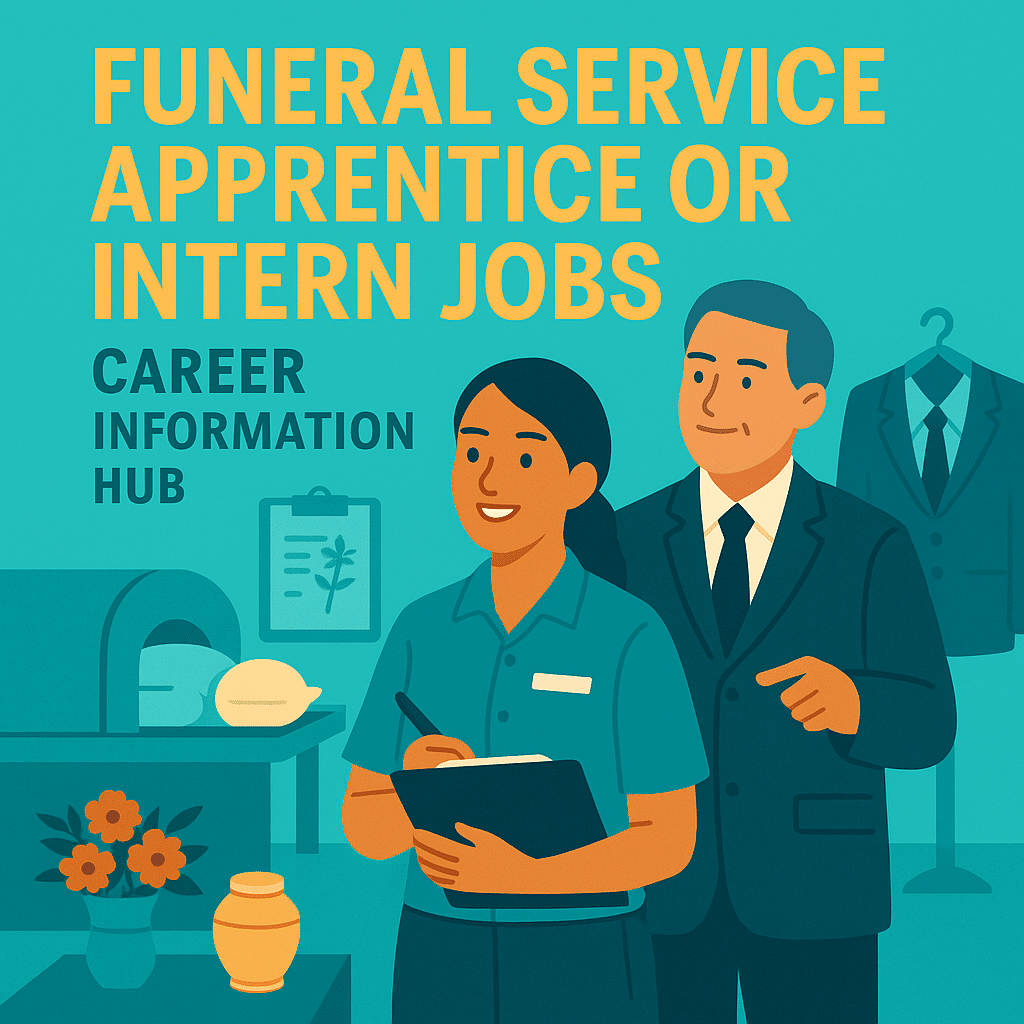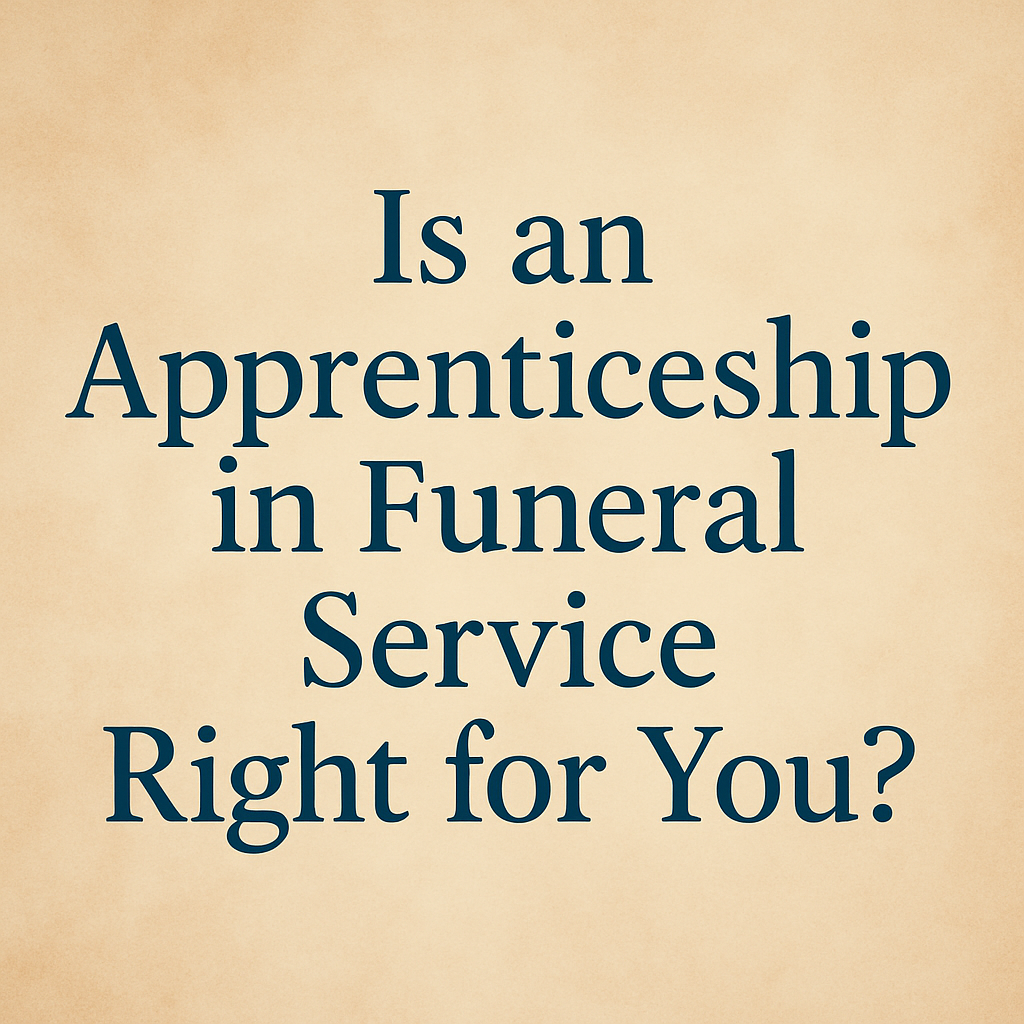Where Your Career In Care Begins
The Funeral Service Apprentice or intern jobs Information Hub
Every funeral director starts somewhere, and this is it. As an apprentice or intern, you’ll gain real-world experience by assisting with arrangements, supporting families, and learning the technical and emotional skills of the profession. It’s a hands-on introduction to one of the most meaningful careers out there and ideal for compassionate, detail-oriented people ready to learn and grow.

Key Things To Know
Before you step into this hands-on role, here are a few important things to understand about what apprenticeship in funeral service really involves.
- There's a difference between an apprenticeship and internship: Apprenticeships are typically formal, state-regulated training programs required for licensure, often lasting 1–2 years and involving direct supervision. Internships, on the other hand, are usually shorter, less regulated, and may be unpaid or for school credit, offering observational or limited hands-on experience.
- On-the-Job Learning: Apprentices and interns shadow licensed professionals, assist with planning and logistics, and learn how funeral homes operate day to day.
- Required by Most States: In many states, completing an apprenticeship or internship is required for licensure as a funeral director or embalmer.
- Usually Paid (But Not Much): These roles are often paid, though wages are modest. The real value is in the mentorship and experience.
- State Registration May Be Needed: You might need to register your apprenticeship with your state board. Make sure to check local rules.
- Not Just Funeral Homes: Some apprentices train at crematories, cemeteries, or larger death care organizations.
- Emotional Intelligence Matters: Beyond skills, you’ll learn how to communicate with compassion and carry yourself with professionalism.
- Mentorship is Key: A great supervisor can make all the difference. Choose carefully if you can.
- Leads to Licensure: Your apprenticeship typically wraps up with board exams and a license application.
- Every Day Is Different: You'll experience everything from service coordination to technical prep, and everything in between.
Why Choose This Career?
Starting as an apprentice or intern gives you a real-world introduction to funeral service that no classroom can match. You’ll witness the impact of your work on grieving families, learn from experienced professionals, and discover whether this path is the right fit for you.
- Hands-on from Day One: You’re not just watching. You’re assisting with real tasks that matter.
- Mentorship Built In: You’ll learn directly from licensed professionals who guide and support your growth.
- Pathway to Licensure: Most states require this step to become a licensed funeral director or embalmer.
- Foundational Experience: Whether you move into funeral directing, embalming, or management, this is where it begins.
- Meaningful Work: You’ll be part of a team that helps people through some of life’s most difficult moments.
- Career Clarity: Not sure if this field is for you? This role lets you find out with real experience.
- High Demand: The funeral profession is aging, and new professionals are needed across the country.
Job Responsibilities
As a funeral service apprentice or intern, your daily responsibilities will vary depending on your supervisor and the funeral home. Most roles involve a mix of observation, direct assistance, and behind-the-scenes tasks.
- Support Licensed Professionals: Assist funeral directors and embalmers with services, planning, and preparation.
- Attend Services and Viewings: Help set up, guide guests, and manage logistics during funeral and memorial services.
- Prepare Decedents: Under supervision, you may help with dressing, casketing, or cosmetic work.
- Complete Paperwork: Assist with death certificates, burial permits, and documentation required for state boards.
- Coordinate Transportation: Help arrange or participate in the transfer of remains between locations.
- Communicate with Families: Learn how to greet guests, answer questions, and offer support with professionalism and compassion.
- Maintain Facilities: Help clean and organize prep rooms, vehicles, and service spaces to ensure everything is in respectful condition.
- Learn State Regulations: Understand legal and ethical requirements in your jurisdiction as part of your licensing process.
- Track Your Hours: Most state boards require a log of your duties and time spent in each area of training.
Education and Certification Requirements
Apprenticeships and internships in funeral service are often tied to formal education, licensure requirements, and your state’s funeral board regulations.
- High School Diploma or GED Required: This is the minimum for most apprenticeships, and some funeral homes may expect more.
- Enrollment in Mortuary Science Program: Many apprenticeships are completed during or after mortuary school, depending on state rules.
- State Registration: Most states require you to register your apprenticeship with the state board before you begin.
- Supervisor Approval: You’ll typically need a licensed funeral director or embalmer to serve as your official sponsor.
- Background Check: Some states or employers may require fingerprinting or a criminal background check.
- Vaccination or PPE Training: Depending on your duties, you may need basic safety or health clearances.
- Completion of Required Hours: States usually mandate a specific number of hours (often 1,000 to 3,000) across key categories like arrangement, preparation, and services.
- State Board Exams: Once your apprenticeship is complete, you may be eligible to sit for the National Board Exam or a state-specific exam.
How To Get Started
Ready to begin your career in funeral service? Here’s what you need to do to start your apprenticeship or internship the right way.
- Research Your State’s Requirements: Every state board has different rules for how and when you can start an apprenticeship. Some allow you to begin before mortuary school, others require enrollment or graduation first.
- Talk to Funeral Homes Near You: Reach out to local funeral homes to ask about apprenticeship or internship opportunities. Many are open to students or career changers who show interest and professionalism.
- Enroll in a Mortuary Science Program (if needed): Even if your state doesn’t require school first, having coursework in anatomy, ethics, and funeral law will make you a stronger candidate.
- Find a Licensed Sponsor: You’ll need a licensed funeral director or embalmer to oversee your training. Some programs match you with a supervisor, while others require you to find your own.
- Submit Registration Forms to the State Board: In most states, you’ll need to officially register your apprenticeship before you begin logging hours. This may include forms, fees, and fingerprinting.
- Get Comfortable in a Professional Setting: You don’t need to have all the answers, but showing up with professionalism, reliability, and a willingness to learn will set you apart.
- Track Your Progress: Once you begin, log your hours and tasks daily, and check in regularly with your supervisor to review your performance.
- Stay Curious and Involved: Attend services, observe arrangements, and ask to help with a variety of tasks. The more you see, the more you’ll learn.
Common Myths
Starting out in funeral service comes with a lot of assumptions. Here are some of the most common myths and the truth behind them.
What Makes Someone A Good Fit
Not everyone is wired for this work, and that’s okay. But if you’re drawn to helping others, can stay calm under pressure, and care about details, you might thrive in this profession.
- You’re compassionate and steady: You’re the kind of person others turn to in hard moments, and you can offer calm without needing to fix everything.
- You’re eager to learn: You don’t need to know it all, but you ask thoughtful questions and stay open to feedback.
- You’re respectful of people’s values: Every family is different. You honor cultural, religious, and personal preferences without judgment.
- You handle responsibility well: You show up on time, follow through, and take care of the details without being reminded.
- You’re okay with tough topics: Death, grief, and hard conversations are part of the job. You don’t have to love them, but you can face them.
- You’re emotionally self-aware: You can recognize when you're overwhelmed and know how to care for yourself while staying present.
- You’re ready to grow: Apprenticeship is all about development. If you want to build a career, this is where the learning begins.
Articles
Frequently Asked Questions
Still have questions? You're not alone. Here are some of the most common things people ask before starting an apprenticeship in funeral service.
Disclaimer: The information provided on this website and by Buried in Work is for general informational purposes only and should not be considered legal advice. Please consult with a qualified attorney or subject matter expert for advice specific to your situation.

